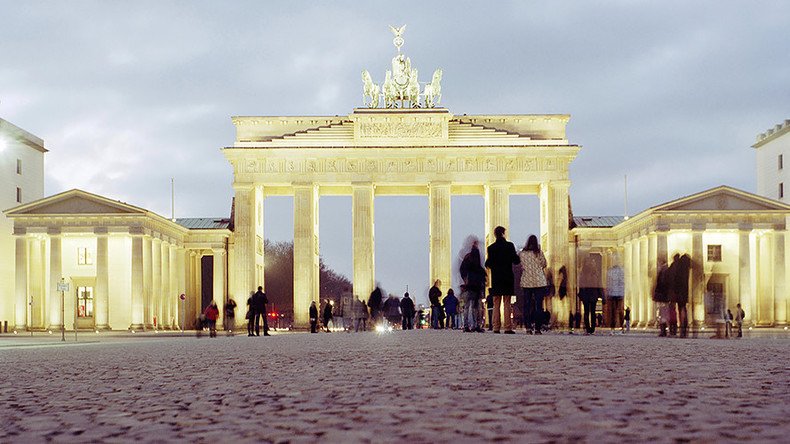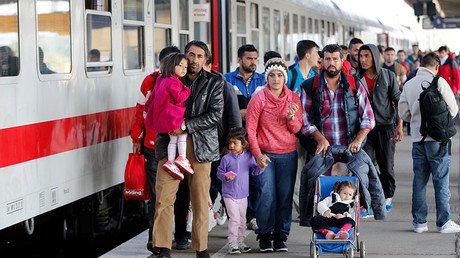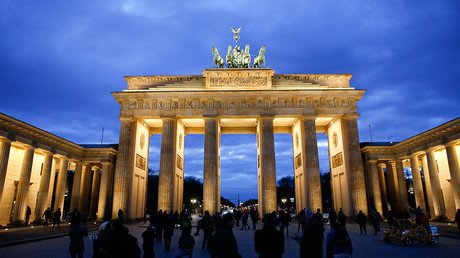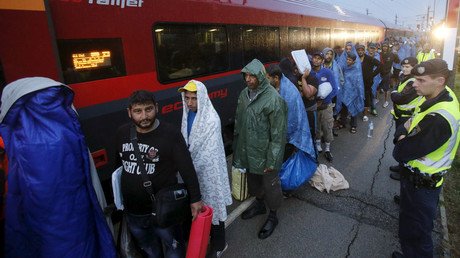‘We do not wear burqa:’ Germany’s interior minister favors introduction of ‘dominant’ culture

The German Interior Minister has expressed support for the idea of introducing a “dominant culture” for German society that would define public life and serve as a guideline for the integration of migrants.
“Those, who feel confident about their own culture, are strong,” Thomas de Maiziere said in an opinion piece published in Bild daily’s weekend edition.
He also said he would like to “stimulate a discussion about a dominant culture for Germany with some theses” presenting a ten-point plan outlining his vision of what he described as a set of core features that define the nature of German society.
According to the minister, German culture manifests itself in a set of specific behavioral patterns which include handshakes upon greetings or revealing one’s identity when making an acquaintance.
“We are an open society. We show our faces. We do not [wear] burqa,” the minister said in his piece, referring to the full-face Muslim veil which has become a controversial subject in Germany recently.
He went on to emphasize the importance of ensuring general education by saying that, in Germany, education is “not only an instrument but also a value.” The minister also said that the idea of personal success and meritocratic principles are also important in Germany.
“We encourage [personal] accomplishments. Good performance and quality bring prosperity. The idea of personal success is what has made our land strong,” de Maiziere said.
He then said that Germany’s history and culture play a significant role in life of the modern German society.
The minister also said that even though Germany “maintains neutrality in its overall worldview,” it is still very much under the influence of Christian culture and values. “In our land, religion is a link and not a wedge between [different parts] of society,” he said, adding, that religion “unites people not only in their beliefs but also in everyday life.”
He said German society is open and friendly to all religions and “lives in a religious peace” based upon “absolute priority of law over all religious regulations in public life.”
“We are probably one of the most consensus-oriented societies of the West,” he said, adding that “compromise is a defining feature of the [German] democracy.”
He also said that Germans reject all forms of violence and accept all ways of life. “We do not link our vision of honor with violence,” the minister said as he apparently condemned the various forms of ‘sacred wars’ and ‘honor killings.’
The Interior Minister stated that Germany “is a part of the West in a cultural, spiritual and political sense,” and pointed at Germany’s close ties with other European nations and the US as an example of this.
He also said that Germany is an indispensable part of a “strong Europe” which in turn helps Germany to pursue its interests. De Maiziere also specifically stressed the role of NATO by saying, it “protects our freedom.”
And although he did not speak about the potential statutory recognition of the proposed set of values and principles, he did say that it should be regarded as guidelines by those seeking to stay in Germany for a long time.
“We offer our hand” to all those who come to Germany and have a right to stay he said, adding that those, who either do not know the German “dominant culture” or do not want to embrace it or even reject it, “would be unlikely to successfully integrate.”
He said German authorities should deal with those who fail to integrate on the assumption of whether their position is “non-negotiable” or at least “tolerable.”
Hindrance to multiculturalism or distraction
De Maiziere’s ideas quickly provoked criticism both by those who believe that a “dominant culture” would become a source of social tension and hinder multicultural development, and those who see it as a distraction used to drum up support for de Maiziere’s Christian democratic Union (CDU) party led by the German Chancellor Angela Merkel ahead of the forthcoming parliamentary elections.
The “dominant culture” would serve the purpose of limiting immigration by rejecting those who fail to integrate some critics say, as reported by Deutsche Welle.
They also argue that the introduction of a set of specific values would inevitably provoke social clashes and would lead to a situation in which this ‘dominant culture’ would be perceived as something superior to other cultures, particularly those of migrants.
Christian Lindner, the chair of the Free Democratic Party (FDP), accused de Maiziere of trying to distract voters from the real issues ahead of the elections. He said the CDU is unable to develop an adequate immigration policy with a solid legal basis under the present circumstances and “re-ignites old debates instead.”
He went on to say that de Maiziere should instead have focused on the immigration law that would make it possible to distinguish between real refugees and those who are just opting to stay in Germany. The politician also accused the minister of making empty promises.
“We do not need a minister, who just ignites senseless discussions, but [we need one], who solves real problems,” Lindner said, as cited by dpa news agency. He also said that Germany already has the necessary basis for a “dominant culture,” which is its “liberal, diverse and open constitution.”
He added that he is “sure that we should hold a discussion about German identity,” which should become a guideline for integration.
De Maiziere is not the first politician who came up with the idea of a “dominant culture” for Germany. In September 2016, the Bavarian ruling party and CDU ally, the Christian Social Union party (CSU), presented a document calling for enshrining the priority of traditional German and Christian values in legislation along with proposals for toughening the country’s refugee policy.
The document also praised the idea of a creating dominant, or “guiding” culture, which was described as “the best countermeasure against the [creation of] parallel societies and ghettos.”
That proposal was sharply criticized by left-wing politicians, who denounced it as “irresponsible” and “racist.”
Almost 1 million migrants from the Middle East and Africa arrived in Germany in 2015, according to official estimates. The massive influx of migrants and refugees stoked social tension and led to numerous anti-government protests against Merkel’s so-called ‘open door' immigration policy.
The idea of a stricter approach to integration has gained traction in recent times among German politicians. Earlier in April, Wolfgang Schaeuble, the German Finance Minister, said that Muslim migrants, who refuse to accept European values, should realize that there are better places for them to live.
Last year, Schaeuble, who is a known long-time Merkel ally, also said that the inflow of refugees was a “challenge for the open-mindedness of mainstream society.”
















